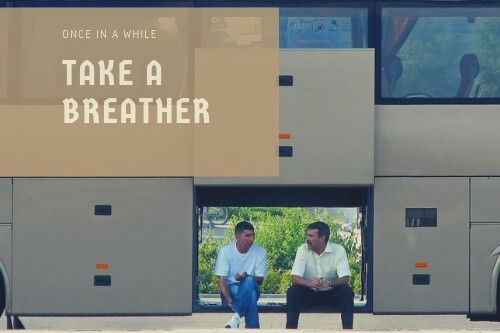YouTube / iTunes / Spotify / Radio Public / Pocket Casts / Google Podcasts / Breaker / Overcast
Listen to ArtisanEnglish.jp posts & lesson intros here.
Expression: Take a breather
We all need to take a breather once in a while.
No one can work continuously without relaxing for a few minutes and catching their breath.
Sure, we all want to be as productive and efficient as possible, but the longer a person works without taking a break to recharge the batteries, the less effective and efficient they become.
Did you know that?
Continuously working late into the night will help you get more things done in the beginning.
However, in the long run, you’ll soon find that your productivity lessens the more hours you work.
When you stop to take a breather, you give your mind and body a chance to do something else.
If you’re working in an office, you can only concentrate on something for so long before your mind wanders.
Yes, there is the idea that a change is as good as a rest, but that’s not the same as stopping altogether.
When you notice your mind starting to wander, you could change your activity.
Instead of working on a report, for example, you could switch to answering some emails.
Eventually, though, no matter how determined you are to give your all, you will need to take a breather, whether you want to admit it or not.
A walk to the local coffee shop instead of just picking up a canned coffee from the vending machine on your floor could be just what the doctor ordered.
Getting out of the office environment for a few moments and away from anything work-related could be a simple way to take a breather.
You could look at it as killing two birds with one stone.
First, you’re getting some needed exercise, and second, you’re allowing your mind to take a breather and relax for a while.
It’s still productive and healthy at the same time.
Flesch-Kincaid Readability Test
This post is understandable by someone with at least a 7th-grade education (age 12).
On the Flesch-Kincaid reading-ease test, this post scores 72.
The easier a passage is to read, the higher the score on a scale of 0 – 100.


